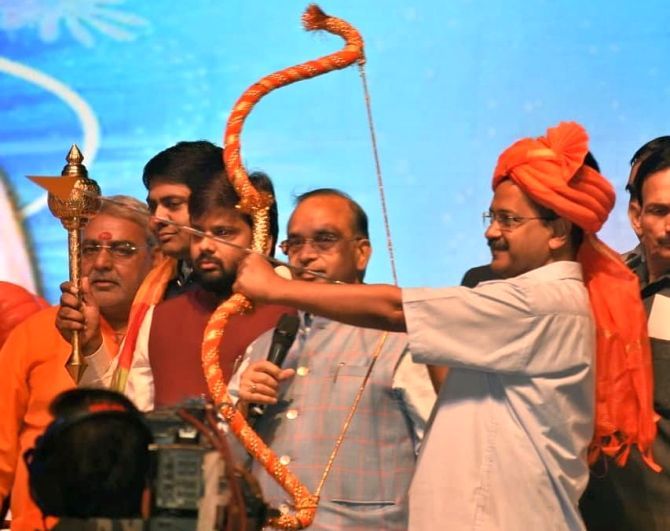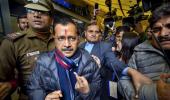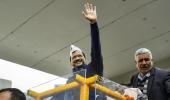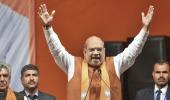Syed Firdaus Ashraf/Rediff.com lists 7 reasons behind Arvind Kejriwal's triumph.

1. No direct attack on Modi
From calling Prime Minister Narendra Damodardas Modi a 'coward and psychopath' in 2015 to completely ignoring him in the run-up to the Delhi assembly election, Arvind Kejriwal has come a long way.
At all the 56 rallies he addressed, Kejriwal never once attacked Modi.
The Modi-led Bharatiya Janata Party won all the 7 Lok Sabha seats from Delhi with a combined vote share of 56.56 per cent in May 2019.
If any party crosses 50 per cent of votes, then there is little chance that it can be defeated.
Kejriwal knew this electoral math well.
So he carefully avoided commenting about the PM and kept the focus on Delhi's issues.
2. If not me, who?
Kejriwal made it a point to highlight that he was the best chief ministerial candidate for Delhi.
He adopted the same strategy which Modi used during the 2019 Lok Sabha election.
Just like the Opposition lacked a face to take on Modi in the general election, the BJP and Congress lacked a face to tackle Kejriwal in Delhi.
The only face the BJP could come up with was actor-turned-politician Manoj Tiwari.
Unfortunately for the BJP, Tiwari's many goof-ups were gleefully propagated by AAP cadres on social media.
Kejriwal only highlighted the good work his government had done in the last five years.
3. Bijli aur Paani
Once upon a time elections were fought on roti, kapda aur makaan.
Post the Ram Mandir and Mandal movements, Indian elections were trapped in religious/caste wrangles.
Kejriwal broke that mould this election.
He made the election about Bijli aur Paani (electricity and water).
In 2012, three years before he became Delhi's chief minister, he launched a campaign against the then Sheila Dixit government over inflated electricity and water bills.
He knew these two issues were core problems for Delhi citizens.
The AAP provided 20,000 litres of water per month for free.
In its five-year rule, the AAP extended Delhi's piped water network from 53 per cent to 98 per cent.
Load-shedding, which was a major problem for Delhi-ites before Kejriwal was elected, became a thing of past under his watch.
Kejriwal's government waived off charges for electricity consumption up to 200 units and offered a 50 percent rebate between 201 and 400 units.
4. Mohalla clinics
AAP claimed it opened 400 mohalla clinics which offered free consultation and medicines at subsidised rates across Delhi.
Kejriwal also increased the capital's health budget to Rs 7,500 crore (Rs 75 billion) from Rs 3,500 crore (Rs 35 billion).
BJP videos pooh-poohed AAP's mohalla clinics, but voters felt their lives have changed for the better under Kejriwal.
5. Schools, education, CCTV cameras
An astonishing achievement of the Kejriwal government.
Kejriwal and his lieutenants Manish Sisodia and Atishi Marlena have completely changed the way government schools functioned in Delhi.
Education in these schools have improved to such an extent that the pass result was 96.2 per cent compared to 93 per cent in private schools.
The AAP government spent Rs 15,600 crore (Rs 156 billion) on education alone.
BJP MP Gautam Gambhir tweeted a video claiming that Delhi government schools were in bad shape, but there were not many takers for the former cricketer's video.
The same with CCTV cameras.
The BJP time and again said AAP had not fulfilled its promise of installing 1.5 million CCTV cameras in Delhi.
In response, Deputy Chief Minister Manish Sisodia screened for the media CCTV footage of Home Minister Amit Anilchandra Shah campaigning in the city.
6. No response to CAA and NRC
Kejriwal steered clear of the controversies over the Citizenship (Amendment) Act and National Register of Citizens.
He left questions on the CAA unanswered and countered it, saying there were no jobs and houses for the people of India, then how would the Modi government provide these amenities to Hindu, Sikh, Buddhist, Christian, Jains and Parsi refugees from Pakistan, Afghanistan and Bangladesh.
He made it a point not to visit Shaheen Bagh, the epicentre of anti-CAA protests in Delhi.
He asked AAP leaders to stay away from Shaheen Bagh as the BJP would use their visits to polarise Hindu voters over the issue.
7. Reciting Hanuman Chalisa
Kejriwal surprised both supporters and adversaries when he recited the Hanuman Chalisa during a television debate.
He followed it up with a visit to a Hanuman temple a day before polling.
'Since I chanted the Hanuman Chalisa, BJP people have constantly made fun of me. Yesterday I went to the Hanuman temple. Today BJP leaders are saying my visit made the temple impure. What kind of politics is this?' Kejriwal tweeted.
'God belongs to everyone. God bless everyone, even BJP leaders. Everyone should be blessed.'











 © 2025
© 2025